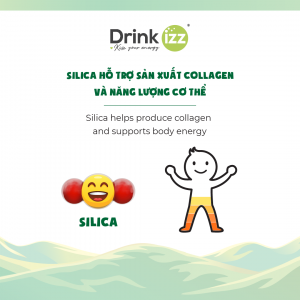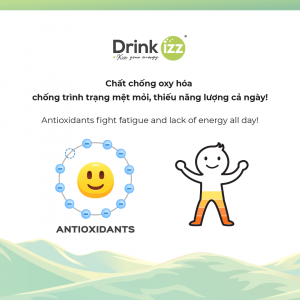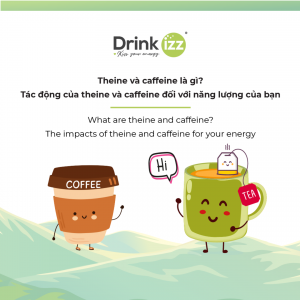Is sugar bad or good for your energy? Sugar is the main source of human energy, and you need to get enough sugar every day to keep the body active. Sugar is bad or good for your energy depending on how you choose which source of sugar to consume (natural, organic, or synthetic) and how you use it. Join Drinkizz to learn more about sugar to understand more about the effects of sugar!
Related Articles:
1. What is a cell and the connection between cells and energy?
2. What is energy and where does it come from?
3. What are theine and caffeine? The impacts of theine and caffeine for your energy
1. What is sugar?
Sugar is a type of carbohydrate, the nutrients most frequently used as an energy source as mentioned in our last article.
To ease your understanding, carbohydrate is measured by gram and each g contains 4kcal. Carbohydrates from food are divided in two types: complex and simple.
- Complex carbohydrates are made up of many simple sugar molecules that are attached together and called polysaccharides. When you consume them, they are broken down into glucose with a slow release of energy. They are starch and fiber found in oatmeal, brown rice, whole-grain bread, popcorn, whole-grain vermicelli, sweet potatoes, legumes, and vegetables.
- Simple carbohydrates, commonly called sugar, are fast-acting and turn into energy as soon as they are consumed. This energy powers the brain and body when sugars are broken down into glucose.
Simple carbohydrates are subdivided into two types: monosaccharides and disaccharides.
There are 3 monosaccharides:
- Glucose – this is one of the most important forms of sugar used by the body for energy. All other carbohydrates (including other sugars) are converted into glucose during the digestion of food. Glucose is naturally found in some fruits and vegetables and the nectar or sap of plants.
- Fructose – is also known as fruit sugar, and is the main sugar found in fruits, berries, honey, root vegetables, and some grains. Our bodies convert fructose to glucose in the liver to use it for energy.
- Galactose – this monosaccharide is mostly found in milk and yogurt. Galactose is primarily converted into glucose or stored as glycogen, a form of energy storage.
And 3 disaccharides:
- Sucrose – this is the most common form of sugar and is usually obtained from sugar cane or sugar beet. Sucrose is the sweetest of all sugars. It can also be found in some fruits and vegetables. Sucrose is made from 1 Glucose + 1 Fructose.
- Lactose – this is what we normally call milk sugar because it is found in all mammals’ milk and dairy products. Lactose is made from 1 Glucose + 1 Galactose
- Maltose – is found in germinating grains such as barley, as well as in malt or malted foods and beverages. It is often called malt sugar. Maltose is made by 1 Glucose + 1 Glucose
In your body, a disaccharide function is to provide your body with a quick source of energy. Because they’re only made up of two sugar molecules, they’re easily broken down by enzymes in your digestive system into their respective monosaccharides and then absorbed into your bloodstream.
People with on-the-go lifestyle can use sugar in the form of simple carbohydrates for a quick boost of immediate energy for their job or sports activities. (1)
2. Is sugar bad or good for your energy?
As we explained in our last article, our body’s preferred energy source is glucose and it’s what we will focus on today.
How does this energy work?
- For the brain, the main source of fuel is glucose. Nerve cells and chemical messengers need glucose to help process information. Without it, your brain wouldn’t be able to work well.
The brain does not have energy stores so it requires a continuous supply of glucose through food and drinks. Per day, the brain needs about 120 g of glucose, which corresponds to 420 kcal. (2)
This can come from simple or complex carbs. Simple sugars enter the bloodstream faster than complex and blood sugar starts to rise 10-15 minutes after a meal, reaching its peak after an hour.
- For the body, all parts (muscles, heart, and liver…) need energy to work for 3 activities: resting metabolism, physical activity, and thermal effect to keep your body at the right temperature.
The higher metabolism you have, the more activity you do, and the colder temperature you live in, the more glucose is needed and used to produce energy.
Extra energy is stored in your liver and muscle cells and readily available as glycogen. (3)
Drinking a glucose-based energy drink is the fastest way to get instant energy. However, if the energy drinks glucose comes from synthetic chemicals, it will be harmful to your health.
Quite often in the current market, energy or soft drinks are made with high fructose corn syrup (HFCS) which is a cheaper alternative sweetener to cane sugar. From a chemical standpoint, HFCS or corn sugar is biochemically and physiologically different from cane sugar.
- HFCS directly affects the liver and produces unhealthy body fats, such as LDL or bad cholesterol and triglycerides. It also has a negative effect on metabolism increasing numerous health issues.
- Prolonged doses or consumptions of soft drinks, sports drinks, and certain foods with HFCS actually create holes in the lining of the intestines. This then allows toxins from the gut and byproducts to cause inflammation in the body. (4)
3. How can Drinkizz’s organic cane sugar support your energy levels for sport and work?
Drinkizz – Organic natural energy, is created with 10 organic plant-based ingredients including the highest quality of organic cane sugar for instant energy delivery and sustaining your energy.
- Drinkizz contains 3 types of sugars: glucose, fructose, and sucrose. Each can contains 7 grams of total sugar per 100 ml, meaning that a 250ml can contains 17.5 grams of total sugar. The best time to drink Drinkizz is 15 minutes before an important meeting or a workout. Based on research, aim for roughly 0.2 g per kg of body weight (5). For example, 1 can of Drinkizz 250ml will provide enough energy for 1 person weighing 75kg exercise 45 – 60 minutes.
- According to research, every kilogram of body weight requires 0.2 grams of sugar (5). For example, a 250ml can of Drinkizz will provide enough energy for a person weighing 75kg to exercise for about 45-60 minutes.
- Drinkizz uses organic cane sugar, which has 7g of total sugar for every 100ml, which contains 6g of added sugar and 1 gram of sugar from other herbal ingredients. That means, each 250ml can contains 15 grams of added sugar, which is within the FDA’s recommended maximum amount of added sugar of 50 grams per day. Through the QRcode on each can, you can track the sugar amount of each batch of production with the test analytics results of SGS – the world’s leading inspection, verification, testing, and certification company.
Drinkizz provides immediately positive energy for you and has a long-term effect to bring you durable strength and fresh beauty.
Sources:
(1): https://www.medicalnewstoday.com/articles/161547#chemistry
(2): https://www.ncbi.nlm.nih.gov/books/NBK22436/
(3): https://www.betterhealth.vic.gov.au/health/conditionsandtreatments/metabolism
(4): https://www.ncbi.nlm.nih.gov/pmc/articles/PMC3649104/#!po=42.5000
(5): https://www.bodybuilding.com/fun/time-your-carbs-perfectly-to-crush-your-goals






